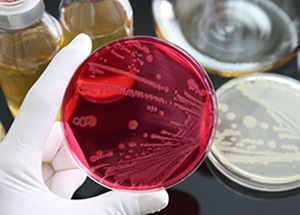It’s the Little Things: A Role for Bacteria in Cancer Treatment
Bacteria account for over 75% of the Earth’s population. And while we often think of these microbes as something to avoid (hand sanitizer, anyone?), emerging research suggests they could help us fight cancer.
In several recent studies, genetically reprogrammed bacteria were able to boost antitumor immunity or enhance the effect of other cancer therapies, suggesting that these tiny organisms could be big allies in the war on cancer.
Many properties make bacteria suitable for cancer treatment: their unique form of motility allows them to easily penetrate tumors; they thrive in the hypoxic and immune-deficient environments of tumors; and they can deplete the tumor microenvironment of nutrients necessary for cancer cell survival. Add to these features an easy-to-modify genome and the power to induce an immune response, and it’s no wonder that scientists are exploring bacteria’s potential in cancer treatment.
There is also historical precedent for the concept, dating back to the 1800s when researchers observed tumor regression in patients infected with certain bacteria. Since the 1970s, a weakened bacterial strain called Bacillus Calmette-Guérin has been effectively used to treat bladder cancer.
Now, researchers are exploring new approaches: engineering bacteria to stimulate antitumor immunity or to deliver cancer-killing drugs. The results, so far, have been promising.
At this year’s AACR Annual Meeting, researchers reported that patients treated with a modified form of Salmonella survived nearly twice as long as patients who received standard therapy.
In the phase II clinical trial, presented by Daniel Saltzman, MD, PhD, a professor and oncologist at the University of Minnesota Medical School, 28 patients with metastatic pancreatic cancer received an oral dose of modified Salmonella in combination with a standard chemotherapy regimen.

The Salmonella used in the trial were engineered to express the immune-stimulating protein IL-2. When ingested by the patient, the modified bacteria are thought to colonize primary and metastatic tumors and express IL-2, which in turn, recruits cancer-killing immune cells to the tumor sites.
“This bypasses the need to systemically administer IL-2 as well as the challenges of delivering the drug itself into solid tumors,” Saltzman explained.
Patients treated with the Salmonella regimen had a median overall survival of 24 months, compared with 13 months for patients treated with chemotherapy alone in prior clinical trials. None of the serious adverse events reported in the study were found to be caused by the Salmonella treatment.
Looking forward, the researchers plan to evaluate the therapy in a randomized phase III clinical trial and are also investigating the potential of this approach to treat other solid tumors.
Back in the lab, preclinical experiments from other research groups are uncovering additional ways to use bacteria to treat cancer.
A recent publication in Science showed that engineered bacteria could be effective against skin cancer. In this study, researchers modified a skin-colonizing strain of Staphylococcus so that it expressed proteins associated with melanoma. When administered to mice alone or in combination with immunotherapy, the bacteria activated tumor-specific immune cells that infiltrated and suppressed the growth of primary and metastatic melanoma lesions.
In another recent study, published in Advanced Healthcare Materials, researchers engineered Escherichia coli to recruit radioactive molecules to tumor sites, thereby avoiding effects associated with traditional radiotherapy. In mice, the modified E. coli selectively colonized solid tumors and attracted a therapeutic radioisotope that had been delivered systemically. The radioisotope was internalized upon binding to a specific receptor on the bacteria and led to the death of surrounding cancer cells. Mice that received the modified E. coli prior to the therapeutic radioisotope had better outcomes than those that were treated with the radioisotope alone, suggesting that the bacteria may allow for enhanced cancer cell targeting.
Together, these three recent studies highlight the immense promise that our microbial neighbors hold against cancer.
As the old adage goes, “It’s the little things in life that matter.” And in cancer treatment, these little microbes just might matter a whole lot—once we learn how to harness their potential.



